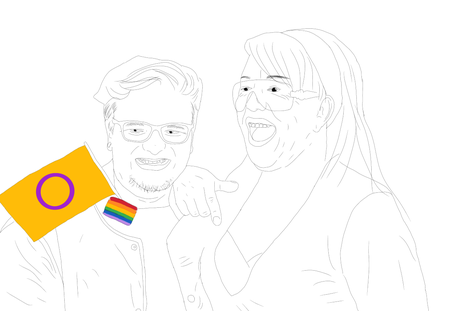

The new Gender Law in Germany:
Under a new law adopted late in December, German citizens now have the legal right to identify themselves as a third gender classified as “diverse” under the regulation, which gives those who wish to do so the right to choose a gender identity that is neither female or male if they are in possession of a doctor’s certificate.
But the new policy regarding intersex children is a necessary attempt to remedy a situation that, up until now, has been horribly difficult. Previously, German parents had just a week's time to decide whether their intersex children were male or female, and register them appropriately at the standesamt or registry office. The pressure on parents meant decisions would often be made in a state of panic and frequently lead to forced medical operations on the babies genitalia.
According to lawmakers, the goal of the new legislation is to lift the social stigma that some transgender individuals claim they are subjected to, leading certain cases to seek unwanted gender reassignment surgery.
What is new?
German law previously allowed a categorical choice of gender, forcing an either-or binary choice of social gender identity, although a chromosome sometimes reveals people are neither.
Until November 2017, the parents of intersex children had to leave the gender box on birth certificates blank. Germany’s constitutional court, however, ruled that denying people a gender was a discriminatory practice, which led to the new legislation being adopted in December.
Who is divers?
Just over 1% of the world’s population is born with both male and female sex characteristics, according to the UN. People who are “divers” have a mixture of male and female chromosomes, genitalia or hormones. Germany is the first EU country to introduce a third category, although a number of EU members allow individuals to retroactively review their social gender identity, including Denmark, Malta, Ireland, Belgium, Portugal, and Norway.
What does it mean for us?
Since the beginning of this month, German parents of "intersex" children can choose between three categories. The German government and legal experts are keen to stress that this third blank box isn't an official third gender, it doesn't mean that there are now three recognized genders in Germany. It's seen as a temporary solution for very specific intersex cases – the children aren't expected to live their lives as X's, but to decide to be male or female at a non-specified point in the future.
Criticism on the new law
Many people view this decision, based on a review by the German Ethics Council, as a huge victory for intersex children. And it really is quite a momentous decision, especially when you consider that up to this point in time, intersex people haven't had any legal recognition on European birth certificates whatsoever.
Some German intersex activists are unhappy with the law, precisely because the blank box isn't an official third gender at all. Main points are:
· 1. the third option does not fully recognize gender diversity
· 2. intersex people can change their marker only based on a medical evidence of their intersex status
· 3. it makes a distinction between trans and intersex people
These points are showing that the new law is upgradable and needs to have a few more changes and options to give equal rights to those, who do not identify themselves as man or women.